Questões de Vestibular
Sobre advérbios e conjunções | adverbs and conjunctions em inglês
Foram encontradas 118 questões

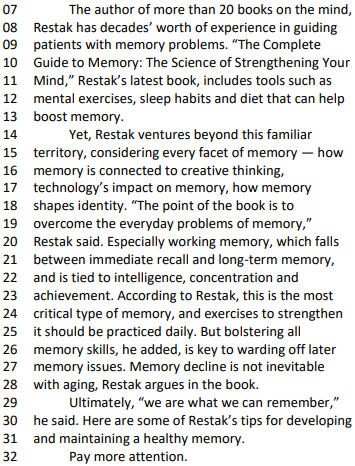
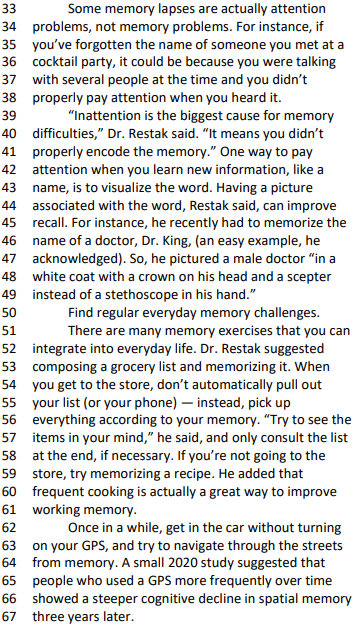
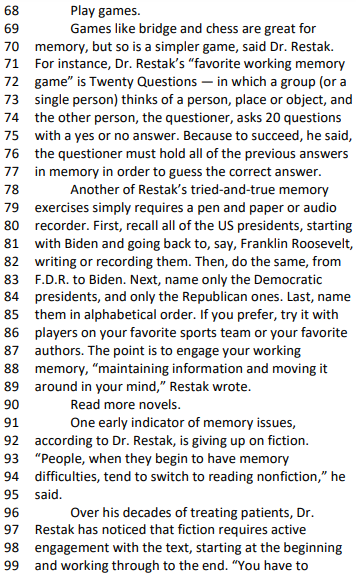
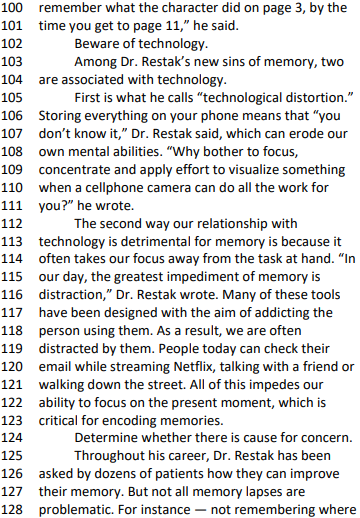
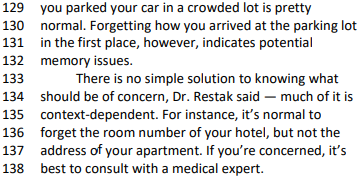






Read the following infographic.
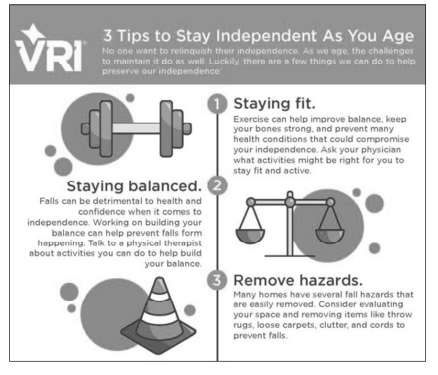
Internet: <www.vricares.com> (adapted)
Based on the infographic presented, judge the follow item.
In the expression “As we age”, in the title of the infographic, “As” is used to present a reason or a justification.
In the excerpt “as the means for fulfilling other possible rights, like happiness” (in the last sentence of the second paragraph), the presence of “the” indicates that people’s happiness depends on them having their civil and political rights respected and guaranteed.
the process has advanced far beyond the point of saving a tooth. (l. 11-12)
A word with the same semantic value can be found in one of the fragments below:

https://www.theguardian.com/environment/
2021/sep/27/

https://www.theguardian.com/environment/
2021/sep/27/
Text 2
Home

No one leaves
home unless home is the mouth of a shark
you only run for the border
when you see the whole city running as well
Your neighbors running faster than you
breath bloody in their throats
the boy you went to school with
who kissed you dizzy behind the old tin factory
is holding a gun bigger than his body
you only leave homewhen
home won‘t let you stay.
No one leaves home unless home chases you
fire under feet
hot blood in your belly
it‘s not something you ever thought of doing
until the blade burnt threats into
your neck
and even then you carried the anthem under
your breath
only tearing up your passport in an airport toilet
sobbing as each mouthful of paper
made it clear that you wouldn‘t be going back.
You have to understand,
that no one puts their children in a boat
unless the water is safer than the land
no one burns their palms
under trains
beneath carriages (…)

I want to go home,
but home is the mouth of a shark
home is the barrel of the gun
and no one would leave home
unless home chased you to the shore
unless home told you to quicken your legs
leave your clothes behind
crawl through the desert
wade through the oceans (…)
No one leaves home until home is a sweaty voice in your ear
saying –
leave,
run away from me now
I dont know what I‘ve become
but I know that anywhere
is safer than here.
By Warsan Shire. Disponível em: https://www.facinghistory.org/educator-resources/current-events/many-faces-global-migration#8 Excertos.
Acesso em: set. 2020.
An increasing body of evidence suggests that the time we spend on our smartphones is interfering with our sleep, self-esteem, relationships, memory, attention spans, creativity, productivity and problem-solving and decision-making skills. But there is another reason for us to rethink our relationships with our devices. By chronically raising levels of cortisol, the body’s main stress hormone, our phones may be threatening our health and shortening our lives.
If they happened only occasionally, phone-induced cortisol spikes might not matter. But the average American spends four hours a day staring at their smartphone and keeps it within arm’s reach nearly all the time, according to a tracking app called Moment.
“Your cortisol levels are elevated when your phone is in sight or nearby, or when you hear it or even think you hear it,” says David Greenfield, professor of clinical psychiatry at the University of Connecticut School of Medicine and founder of the Center for Internet and Technology Addiction. “It’s a stress response, and it feels unpleasant, and the body’s natural response is to want to check the phone to make the stress go away.”
But while doing so might soothe you for a second, it probably will make things worse in the long run. Any time you check your phone, you’re likely to find something else stressful waiting for you, leading to another spike in cortisol and another craving to check your phone to make your anxiety go away. This cycle, when continuously reinforced, leads to chronically elevated cortisol levels. And chronically elevated cortisol levels have been tied to an increased risk of serious health problems, including depression, obesity, metabolic syndrome, Type 2 diabetes, fertility issues, high blood pressure, heart attack, dementia and stroke.
(Catherine Price. www.nytimes.com, 24.04.2019. Adaptado.)
No trecho do primeiro parágrafo “But there is another reason for us to rethink our relationships with our devices”, o termo sublinhado introduz uma
Leia o texto a seguir para responder à questão.
Artificial intelligence and the future of medicine
Right now, the challenges we need to address as we try to bring AI into medical practice include improving the quality of the data that we feed into AI systems, developing ways to evaluate whether an AI system is actually better than standard of care, ensuring patient privacy and making sure not only that AI doesn't disrupt clinical work flow but in fact improves it. But if doctors do their jobs right and build these systems well, much of what we have described will become so ingrained in the system, people won't even refer to it separately as informatics or AI. It will just be medicine.
My sister is married _____ she lives in London.
Assinale a alternativa que preencha corretamente a lacuna.
TEXTO
The Future Of Work: 5 Important Ways Jobs
Will Change In The 4th Industrial Revolution



Fonte:
https://www.forbes.com/2019/07/15


Leia o texto para responder à questão.
Dying to defend the planet: why Latin America
is the deadliest place for environmentalists

February 11, 2017
Defending nature is a dangerous occupation, especially in Latin America. According to a recent report by Global Witness, an NGO, 185 environmental activists were murdered worldwide in 2015, an increase of 59% from the year before. More than half the killings were in Latin America. In Brazil 50 green campaigners died in 2015. Honduras is especially dangerous: 123 activists have died there since 2010, the highest number of any country relative to its population. Berta Cáceres, an indigenous leader who was a prominent campaigner against dams and plantations, was murdered there.
Why is Latin America so deadly? One reason is its abundant natural resources, which attract enterprises of all sorts, from multinationals to mafias. When prices are low, as they are now, the most rapacious do not go away; to maintain their profits they become more aggressive, says David Kaimowitz of the Ford Foundation, which gives money to good causes. New technologies open up new battlefronts. Soya beans bred to grow in tropical conditions have encouraged farmers to displace cattle ranchers, who in turn have advanced into the rainforest. Small prospectors can now extract gold from soil rather than just hunting around. That opens up new areas for exploitation, such as San Rafael de Flores in south-eastern Guatemala, where activists have been murdered.
The odds of finding the criminals are greater if the victim is foreign. Dorothy Stang, an American nun who fought to protect the Amazon rainforest, was killed in Brazil 12 years ago. Both the gunman and a rancher who had hired him eventually went to jail. But that is an exception.
(https://www.economist.com/the-americas/2017/02/11/
why-latin-america-is-the-deadliest-place-for-environmentalists. Adaptado)
To answer question, read the following text.
The movies that rose from the gave
It may disappear for a while, stay out of sight, out of mind, but sooner or later it will rise again, and no matter what we do, or how hard we try, it will never, ever die. A zombie? Hardly, rather our own fascination with what popular culture now refers to as “the living dead”.
Zombies have dominated mainstream horror for more than half a decade. They’re everywhere: movies, books, videogames, comics, even a new Broadway musical adaptation of Sam Raimi’s The Evil Dead. Not only have they replaced previous alpha-monsters such as vampires and werewolves, (1) ___________ are continuing to generate more interest (and revenue) than almost all other creatures put together. Given that several years ago the living dead were considered an obscure and largely underground sub-genre, it would not be an exaggeration to state that they have enjoyed a spectacular rebirth (2) ___________ anything in the history of modern horror.
Where did these creatures come from? Why are they so popular now? And when, if ever, will their reign of terror cease?
(3) ___________ many cultures have their own myths concerning the raising of the dead (one going as far back as the epic of Gilgamesh), the word “zombie” can trace its origins back to west Africa. The legend involves a “houngan” (wizard) using a magical elixir to transform a living human into a mobile, docile and obedient corpse. The fact that this legend is deeply rooted in reality (Haitian zombie powder was discovered to contain a powerful neuro-toxin that caused a live victim to behave like a resurrected corpse) may explain why, when African slaves were brought to the Americas, European colonists also embraced the notion of the living dead.
For several centuries the voodoo zombie remained the staple of tall tales, stage productions, and even early Hollywood movies (4) ___________White Zombie (1932) and I Walked With a Zombie (1943). It wasn’t until 1968 that up-and-coming film maker George A Romero gave us a whole new reason to be afraid. Night of the Living Dead replaced the image of a harmless voodoo-created zombie with a hostile, flesh-eating ghoul that swelled its numbers to pandemic proportions. This new ghoul was the result of science, not magic, specifically radiation from a returning space probe. This new ghoul could, likewise, only be dispatched by a scientific solution: destroying the brain or severing it from the rest of the body. This new ghoul obeyed no one, (5) ___________its own insatiable craving for living, human flesh. In fact, this new ghoul was only referred to throughout the movie as a ghoul. The word zombie was never mentioned.
Available at :< https://www.theguardian.com/film/2006/nov/10/1>. Acess on: 23 mar. 2018.
Check the alternative that shows the sequence of words that CORRECTLY fill in the spaces 1-5.
TEXTO 01
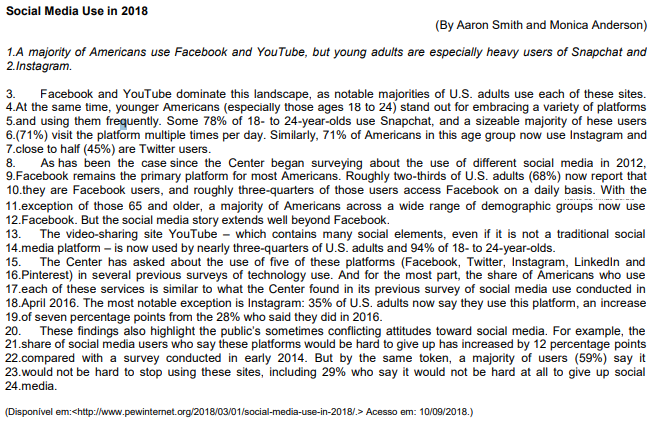
Responda a questão de acordo com o texto de Lauren Camera.
Supreme Court Expands Rights for Students with Disabilities
By Lauren Camera, Education Reporter - March 22, 2017. Adaptado.

In a unanimous decision with major implications for students with disabilities, the U.S. Supreme Court ruled Wednesday that schools must provide higher educational standards for children with special needs. Schools must do more than provide a ‘merely more than de minimis’ education for students with disabilities and instead must provide them with an opportunity to make "appropriately ambitious" progress in line with the federal education law.
“When all is said and done,” wrote Chief Justice John G. Roberts, “a student offered an education program providing a ‘merely more than de minimis’ progress from year to year can hardly be said to have been offered an education at all.” He continued, citing a 1982 Supreme Court ruling on special education: “For children with disabilities, receiving an instruction that aims so low would be equivalent to ‘sitting idly... awaiting the time when they were old enough to drop out.’”
There are roughly 6.4 million students with disabilities between ages 3 to 21, representing roughly 13 percent of all students, according to Institute for Education Statistics. Each year 300,000 of those students leave school and just 65 percent of students with disabilities complete high school.
The case which culminated in the Supreme Court decision originated with an autistic boy in Colorado named Endrew. His parents pulled him out of school in 5th grade because they disagreed with his individualized education plan. Under federal law, the Individuals with Disabilities Education Act (IDEA), schools must work with families to develop individualized learning plans for students with disabilities.
While Endrew had been making progress in the public schools, his parents felt his plan for that year simply replicated goals from years past. As a result, they enrolled him in a private school where, they argued, Endrew made academic and social progress.
Seeking tuition reimbursement*, they filed a complaint with the state’s department of education in which they argued that Endrew had been denied a "free appropriate public education". The school district won the suit, and when his parents filed a lawsuit in federal district court, the judge also sided with the school district. In the Supreme Court case, Endrew and his family asked for clarification about the type of education benefits the federal law requires of schools, specifically, whether it requires ‘merely more than de minimis’, or something greater.
“The IDEA demands more,” Roberts wrote in the opinion. “It requires an educational program reasonably calculated to enable a child to make progress appropriate in light of the child’s circumstances.”
*reimbursement – a sum paid to cover money that has been spent or lost.
In:<https://www.usnews.com/news/education-news/articles/2017-03-22/supreme-court-expands-rights-for-students-with-disabilities>

